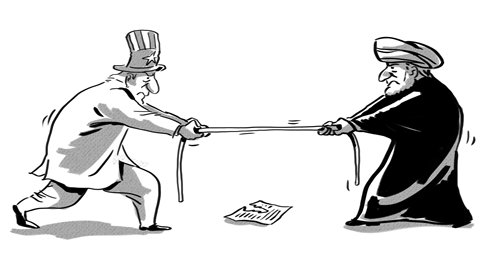
Illustration: Liu Rui/GT
One year after the US withdrawal from the Iran nuclear deal signed in 2015, Iran announced on May 8 it will no longer fully comply with the agreement.
Iranian President Hassan Rouhani tweeted that other signatory countries "will face Iran's further actions if they cannot fulfill their obligations within the next 60 days and secure Iran's interests," indicating Tehran's announcement did not signal the end of the deal, but set a 60-day deadline for new terms to the nuclear agreement.
Despite many restrictions brought about by the nuclear deal, Iran had been earnestly implementing the agreement over the last few years. The process was not easy.
Tehran's plans to stop complying with certain parts of the deal if its requirements cannot be met are in fact a decent way of forcing relevant parties to return to the negotiating table. The country is temporarily retreating in order to advance.
Hence, the risk of Iran's further steps remains very low within these 60 days.
Two options are available now for the US: either to talk with Iran at its request or ignore Iran's demands and continue to enforce sanctions. It is very much likely that Washington will choose the latter.
The US current policy on Iran is not attacking but besieging it. However, 60 days later, Iran will face more difficult days.
The US is waiting for Iran's internal changes. The reason why Washington will not resort to military means is that external intervention will only lead to a stronger Iranian system. US Secretary of State Mike Pompeo reportedly told the Iranian-American community on April 22 that the Trump administration is "not going to do a military exercise inside Iran" to expedite a regime change.
The situation Iran is in is currently the core and focus of the entire region. The US, along with Arab countries and Israel, has formed an extensive political and military alliance to contain Iran. This alliance's primary task is to curb Iran's expansion of influence in the Middle East. Although the US is the initiator, it is countries in this region that are vital force to contain Iran.
Iran has set a tone - it will no longer be restrained by Iran nuclear deal if world powers fail to negotiate new terms for the deal. But there is no chance that the US will obey Tehran's order.
The UK, France and Germany, as signatory nations of and contributors to the Iran nuclear deal, have reaffirmed their position on maintaining the agreement. Prior to this deal, these European countries lost a large share of trade with Iran due to the US additional sanctions on Tehran.
After signing the deal, most trade activities with Iran had resumed. Thus they are very much willing to keep this deal, which is in the interest of Europe, especially in terms of trade.
But one thing should be made clear: Once conflicts break out between the US and Iran, these European countries will very unlikely stand on the Iranian side at the risk of hurting the US interests.
China, also a facilitator and supporter of the Iran nuclear deal, has always stated that the agreement "should be implemented fully and effectively for its vital role in the international non-proliferation regime and peace and stability in the Middle East," and has always opposed "US sanctions and so-called long-arm jurisdiction on Iran." China has consistently supported the resolution of disputes through political channels rather than resorting to war.
Nonetheless, since China is also having disputes with the US over its own affairs including the trade war and the Taiwan question, Beijing may only have limited influence on the Iran issue.
The author is a research fellow with the Institute of West-Asian and African Studies at the Chinese Academy of Social Sciences. opinion@globaltimes.com.cn
